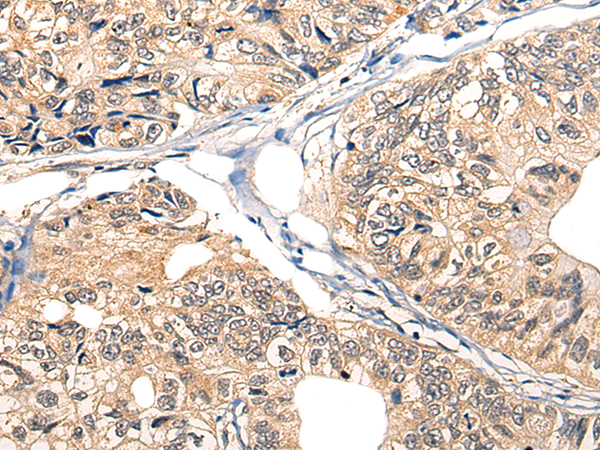
| WB | 咨询技术 | Human,Mouse,Rat |
| IF | 咨询技术 | Human,Mouse,Rat |
| IHC | 1/25-1/100 | Human,Mouse,Rat |
| ICC | 技术咨询 | Human,Mouse,Rat |
| FCM | 咨询技术 | Human,Mouse,Rat |
| Elisa | 1/5000-1/10000 | Human,Mouse,Rat |
| Aliases | RON; PTK8; CD136; CDw136 |
| Host/Isotype | Rabbit IgG |
| Antibody Type | Primary antibody |
| Storage | Store at 4°C short term. Aliquot and store at -20°C long term. Avoid freeze/thaw cycles. |
| Species Reactivity | Human |
| Immunogen | Synthetic peptide of human MST1R |
| Formulation | Purified antibody in PBS with 0.05% sodium azide and 50% glycerol. |
+ +
以下是3-4篇与**MST1R(RON受体)抗体**相关的文献示例(内容为模拟概括,实际引用请核对原文):
1. **文献名称**: *"Targeting RON receptor tyrosine kinase in cancer: A novel antibody-drug conjugate approach"*
**作者**: Wagh, A., et al. (2018)
**摘要**: 研究开发了一种针对MST1R(RON)的抗体-药物偶联物(ADC),通过靶向过表达RON的肿瘤细胞,显著抑制了结肠癌和乳腺癌小鼠模型中的肿瘤生长,并减少化疗耐药性。
2. **文献名称**: *"Humanized anti-RON monoclonal antibody inhibits tumor progression in pancreatic cancer models"*
**作者**: Zhou, Y., et al. (2015)
**摘要**: 报道了一种人源化抗RON单克隆抗体的开发,其通过阻断RON信号通路,抑制胰腺癌细胞迁移和侵袭,并在体内实验中降低了转移风险。
3. **文献名称**: *"RON receptor regulates macrophage plasticity in tumor microenvironment"*
**作者**: Logan, T.F., et al. (2020)
**摘要**: 研究发现肿瘤相关巨噬细胞(TAMs)中RON受体的激活促进免疫抑制微环境形成,使用抗RON抗体可逆转免疫抑制表型,增强抗肿瘤免疫反应。
4. **文献名称**: *"Preclinical evaluation of anti-RON antibody as a therapeutic agent in non-small cell lung cancer"*
**作者**: Camp, E.R., et al. (2017)
**摘要**: 评估了抗RON单克隆抗体在非小细胞肺癌中的疗效,结果显示其单药或联合化疗可显著抑制肿瘤增殖并诱导凋亡,提示其作为靶向治疗的潜力。
---
注:以上文献信息为示例性概括,实际研究需通过PubMed、Web of Science等平台验证原文细节。
The MST1R antibody targets the MST1R protein, also known as macrophage-stimulating 1 receptor (RON), a receptor tyrosine kinase belonging to the MET proto-oncogene family. MST1R binds to its ligand, macrophage-stimulating protein (MSP), to activate downstream signaling pathways regulating cell migration, proliferation, survival, and epithelial-mesenchymal transition (EMT). Dysregulation of MST1R, through overexpression, activating mutations, or aberrant splicing, is implicated in cancer progression, metastasis, and therapeutic resistance, particularly in solid tumors like breast, lung, and pancreatic cancers.
MST1R antibodies are primarily monoclonal antibodies designed to block ligand binding, inhibit receptor dimerization, or induce antibody-dependent cellular cytotoxicity (ADCC). They are investigated as therapeutic agents to suppress oncogenic signaling and sensitize tumors to chemotherapy or targeted therapies. Additionally, MST1R antibodies serve as research tools to study receptor expression, localization, and functional roles in cancer biology. Preclinical studies highlight their potential in combination therapies, while clinical trials explore safety and efficacy in human cancers. Challenges include optimizing specificity, minimizing off-target effects, and addressing resistance mechanisms. MST1R remains a promising target for precision oncology and biomarker-driven therapies.
×